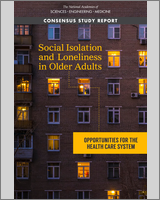From: Summary

NCBI Bookshelf. A service of the National Library of Medicine, National Institutes of Health.
Develop a more robust evidence base for effective assessment, prevention, and intervention strategies for social isolation and loneliness;
Translate current research into health care practices in order to reduce the negative health impacts of social isolation and loneliness;
Improve awareness of the health and medical impacts of social isolation and loneliness across the health care workforce and among members of the public;
Strengthen ongoing education and training related to social isolation and loneliness in older adults for the health care workforce; and
Strengthen ties between the health care system and community-based networks and resources that address social isolation and loneliness in older adults.
From: Summary

NCBI Bookshelf. A service of the National Library of Medicine, National Institutes of Health.